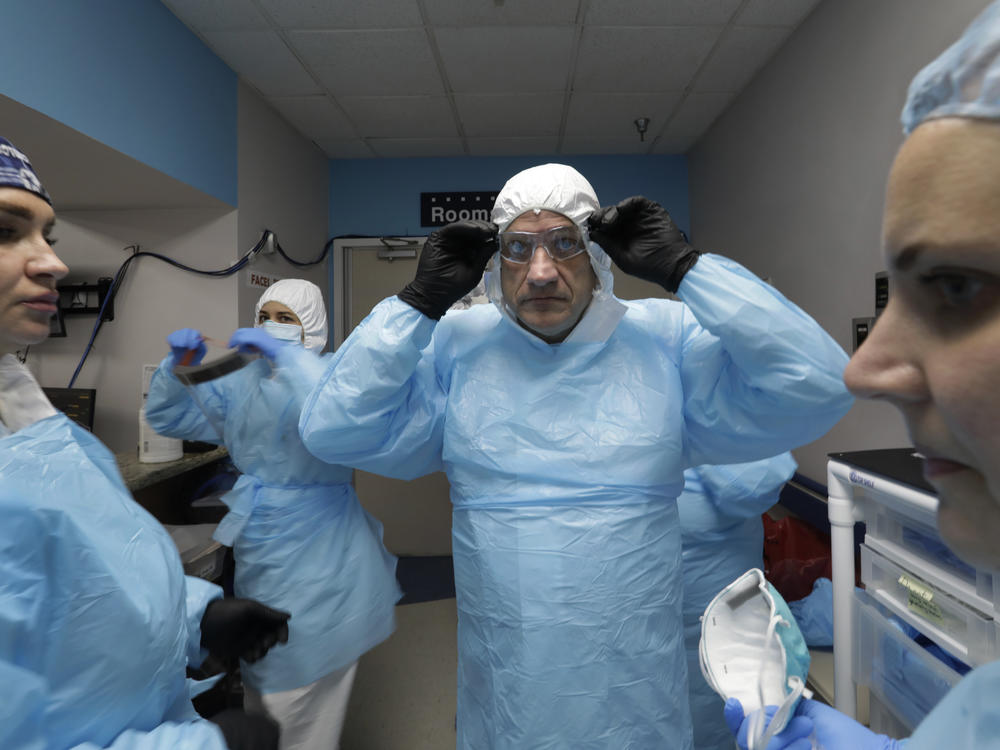Section Branding
Header Content
At Houston Hospital, Head Of COVID-19 Unit Sees Some Staff Wary Of A Vaccine
Primary Content
As chief of critical care at Houston's United Memorial Medical Center, Dr. Joseph Varon is at the center of managing care for patients with the coronavirus. He's worked every day for the last 272 days.
"No days off," he told NPR's Morning Edition.
It's been a grueling pace at Varon's hospital for months.
These days, due to a post-Thanksgiving surge, he says, at least a half-dozen critically ill patients are admitted daily to his COVID-19 unit. It's taking a toll on the already stretched-thin and stressed-out staff.
"I have nurses that in the middle of the day will start crying, just crying because the load is humongous," he said. "They see patients die."
Varon said that starting next week doctors and nurses at the hospital will begin receiving doses of the recently authorized Pfizer vaccine. Hospital staff, he said, were "very happy" learning this news.
Still, despite clinical trials showing the vaccine to be 95% effective, Varon said that some of the nurses on his unit tell him they're not planning on getting vaccinated.
"Yesterday I had a – not a fight, but I had a friendly argument with more than 50% of my nurses in my unit telling me that they would not get the vaccine," he told Morning Edition.
Some of those nurses have had family members admitted to the hospital, gravely ill with COVID-19. But he said some nurses and hospital staff members — many of whom are Latinx or Black — are skeptical it will work and are worried about unfounded side effects.
According to the Pew Research Center, skepticism in a COVID-19 vaccine is highest among African Americans. While 60% of Americans overall say they intend to get vaccinated, fewer than half of Black adults say they will get a vaccine, according to Pew.
Among health care workers, most say they plan to get vaccinated, according to a survey by the Centers for Disease Control and Prevention shared at a public meeting of its vaccine advisory committee last month.
But inside his hospital, Varon said, the COVID-19 vaccine has become a political point for some.
"Most of the reasons why most of my people don't want to get the vaccine are politically motivated," he said. Among the six or seven nurses who told him they won't get a vaccine, there is deep distrust.
"My discussions with them make me think the fact that [President] Trump is in charge of accelerating the process bothers them," he said. "They all think it's meant to harm specific sectors of the population."
He plans to continue to talking to his staff to dispel misinformation and encourage people to change their minds while also showing them scientific data supporting the vaccine's safety. "Hopefully I can convince some people to do the right thing," he said.
With respect to the general community and the vaccine, Varon said there is a misconception that emergency authorization means public health has already improved.
"People are dropping their guard. My primary concern is ... they think the vaccine is going to fix it, and it's going to fix it fast," he said. "No, the vaccine will work, but it's going to take time. It's going to be months and more months and probably even years before everyone gets vaccinated."
Dr. Anthony Fauci told NPR this week that half of all Americans would need to be vaccinated before seeing an impact, and that 75% to 85% of the population would need the vaccine to have blanket herd immunity. He predicted the U.S. could begin to see early stages of herd immunity by late spring or summer.
Varon said he is worried about a post-Christmas surge that he expects will be even worse than what his unit is seeing now.
"I am now seeing the effects of what happened in Thanksgiving. ... We're going to have the same after Christmas because people are not understanding," Varon said. "People don't understand that having a virtual Christmas is what we need to do this year instead of ending up in our intensive care units."
Copyright 2020 NPR. To see more, visit https://www.npr.org.

